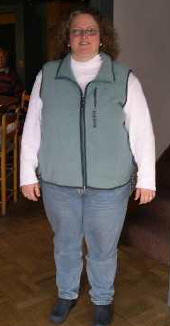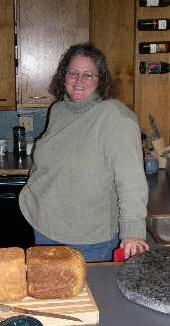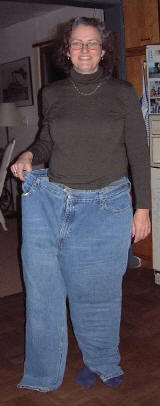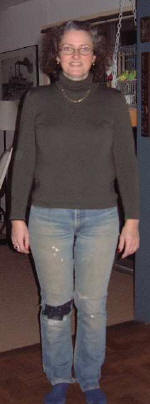|
It has been just over a year since I had
my RNY gastric bypass surgery, so I guess it's time to share
my success story with you and your readers. I can't believe
the year has gone so fast!
At the end of April, 2003, as I was
thoroughly chewing my ¼ cup of cottage cheese three weeks
after my Roux-en-Y gastric bypass surgery, I watched an Oprah
show on people who lost significant amounts of weight
without surgery (emphasis Oprah’s). Boy, did that make me
feel like a slacker – not much change from the way I’ve felt
about myself for much of my life as far as weight was
concerned. I still struggle with the nagging feeling that I
should have been able to do this on my own. But first, here
is some history...
Like many of the people I talk to in my
support group, I always struggled with my weight and lost my
battle during my pregnancies, gaining 30-50 pounds with each.
I was only able to maintain a low weight in high school and
college by forcing myself to eat a very small amount of food
(roughly equal to what I eat now post-surgery; only now I have
the help of a tiny stomach and don't have to make myself do
it). I’ve spent decades trying to lose weight the “right”,
slow, “better life-style” way. I worked hard at it, such as
the 15 months I exercised 6 hours a week until a back injury
forced me to quit. (I had lost 15 pounds during that time, so
only another 10 or so years of that would have gotten me to
goal). I found out that I had degenerative joint disease in
my back and was told losing weight might slow down the
progress of the disease. Having watched my (normal-weight)
father suffer through three back surgeries, I felt it had come
to a choice between surgery now or surgery later. I also felt
that my system was a little like the heating system at work –
there was no way to tell exactly why it was running hot in
spite of lowering the thermostat, but until a cause could be
found there were mechanical ways to change the temperature.
I spent months researching weight loss
surgery and surgeons to determine who would be most qualified
to perform such risky surgery on me. Then I spent another
nine months meeting the criteria set forth by the insurance
company and my surgeon. Like you, Barbara, I decided Dr.
Phillip Schauer was the best of the best, and he is exactly as
you describe in your book. By the time I had the surgery,
over a year had passed since I admitted to myself that my
health was deteriorating and there was nothing more I could do
on my own. Dr. Schauer made it clear to me what risks I was
taking as well as the changes in exercise, eating, and vitamin
regimen I would need to agree to. My last comment to him in
my pre-op appointment was, “I feel kind of weird doing
something this drastic to myself when there’s nothing really
wrong with me.” He replied that the obesity was already doing
damage that could be measured in my blood pressure, joint
pain, and asthma, and it was most certainly going to cause
more problems later. Having the surgery when I was relatively
healthy was ensuring the lowest risk and the highest chance of
reversing the damage. He emphasized that obesity is
recognized by the National Institutes of Health as a chronic
disease and with 120 pounds to lose I only had a 1% chance of
succeeding at losing the weight permanently on my own.
I started out at 266 pounds and size 24.
I’m now below 160 pounds and size 8-10. I go to the gym
regularly – something I couldn’t maintain before because my
extra weight caused me to get hurt and end up sidelined, only
to regain any weight I had just exercised away. I can go
kayaking with my son now that my butt doesn’t get stuck in the
kayak anymore. I can walk 4-5 miles without pain where before
I could only walk 2 before my foot and knee would get
unbearably sore. By the way, I spent most of those 2-mile
walks pre-surgery discussing with myself if I should really go
for the surgery. I must have looked pretty batty to my
neighbors. My blood pressure is lower without medication, my
asthma is much better controlled, my joint pain is improved,
and I sleep better than I ever imagined I would again. The
only vitamin deficiency I have is an iron level too low to
give blood.
As far as eating, I can now eat just
about anything but my old favorite, General Tso's chicken. It
is deep-fried and sweet – a deadly combination for the pouch!
My tummy has trained me to prefer grilled meats, thank you
very much.
Now back to that nagging feeling that I
should have been able to do this by myself. The media seem to
be having a field day with weight loss surgery. Either people
are trying to have it in spite of not meeting the criteria, or
obese people are like smokers, choosing a lifestyle they know
is unhealthy and then blaming others for their problems (never
mind that one doesn't NEED cigarettes to stay alive). The
media love to point out that we're a nation looking for a
quick fix and weight loss surgery is today's answer. Even
though this may be a nation of people looking for a “quick
fix,” weight loss surgery is not in that category. That is
sort of like saying having a baby by
cesarean
section is an easy delivery.
For all the extremes mentioned by the
media, there are many more people who agonize over whether to
have the surgery and come to the decision only when something
happens to drive them over the edge, like being prescribed
just one more medication, finding out they have diabetes, or
finding themselves letting the weight keep them from doing
what they want to do. These are people who learn about all
the risks, learn about the surgery itself, attend the support
groups, and do their best to do the right things afterwards to
maximize their health. Oh yes, and we may end up looking
better, too – but our main focus is improving our health.
Sincerely,
Marisette L. Edwards
Glenshaw, PA

Before |

Before |

After |

After |
|